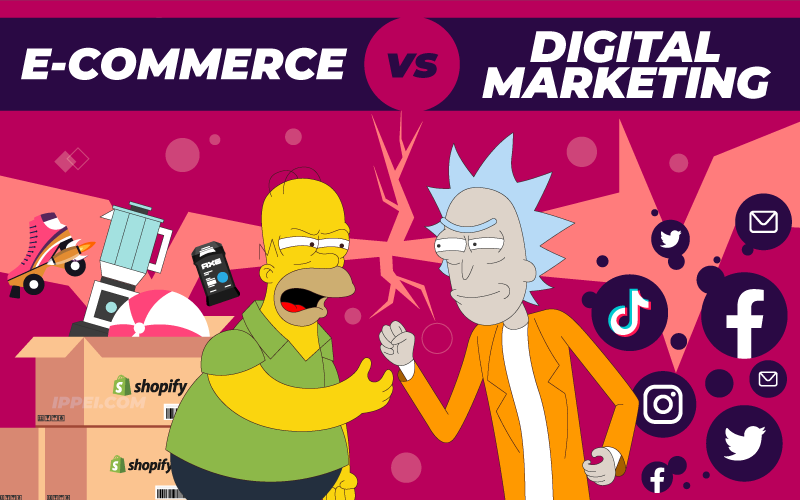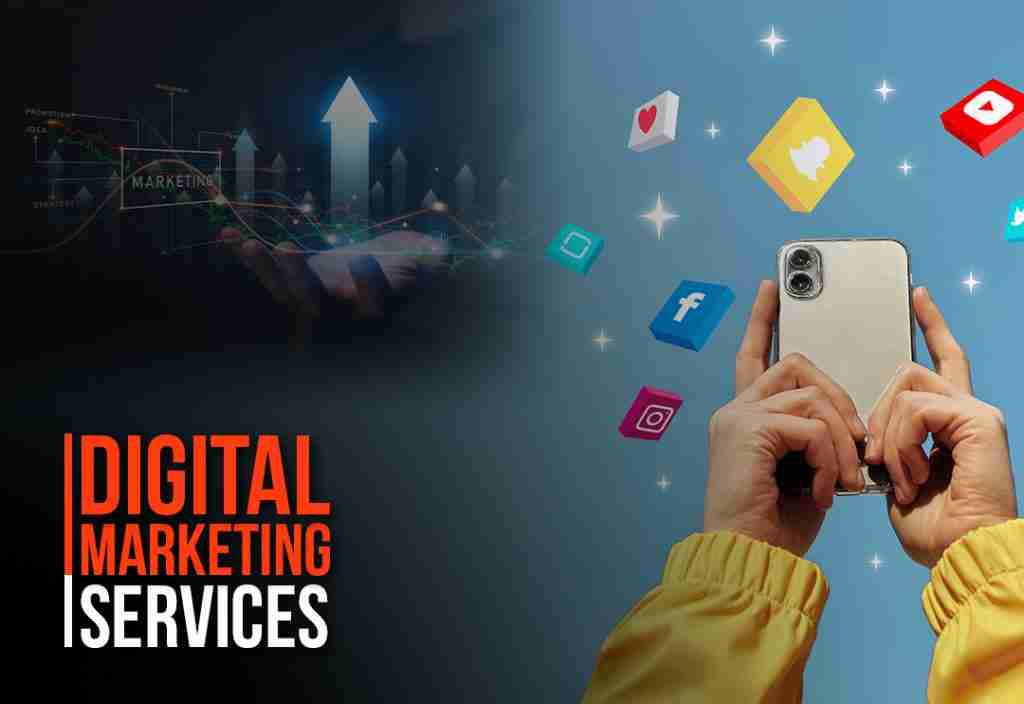Within the bustling core of the contemporary digital age, where the constant hum of business transactions can be heard with every online interaction, two dominant forces stand out: Digital Marketing vs E-commerce. Even though these terms are frequently utilized interchangeably, they embody separate elements within the interconnected online business environment.
Digital marketing is like a storyteller that uses various online channels to captivate and engage the audience. It aims to build relationships and create an immersive online experience by utilizing strategies such as social media, SEO, content marketing, email campaigns, and paid advertising. Its goal is to take potential customers on a journey of awareness and connection.
E-commerce has transformed the way we buy and sell, creating a virtual marketplace where consumers can browse through a wide range of products and make purchases easily. It offers an immersive experience, with digital storefronts that showcase products just like well-lit shop windows. Consumers can navigate through numerous options, compare them, click on their choices, and add them to their virtual shopping carts. This blog will explore the intricacies of Digital Marketing vs E-commerce, examining their distinct functions, disparities, and the symbiotic relationship they share in the online world.
Digital Marketing vs E-Commerce: Which Yields Better ROI?

- Digital marketing involves using digital channels, platforms, and technologies to promote products or brands. Thus, it includes activities like Search engine optimization, social media marketing, content marketing, email marketing, and paid advertising.
- The main goal of digital marketing is to connect with target audiences, increase brand awareness, drive traffic, and generate leads and conversions. Thus, one key aspect of digital marketing is its ability to adapt and refine strategies based on real-time analytics and data-driven insights.
- It provides tools and methods to tailor campaigns for maximum impact, whether it’s reaching a global audience or targeting a specific demographic.
- In e-commerce, buyers and sellers transact goods and services digitally, representing the online version of traditional commerce. Thus, it enables conducting transactions on websites or mobile apps.
- E-commerce has changed the way people shop by providing convenience, choice, and accessibility. Therefore, online platforms act as virtual stores, allowing businesses to display their products, process secure transactions, and ensure smooth marketplaces and easy setup of independent e-commerce websites has made retail accessible to border fulfillment.
Distinguishing Features to Help You Choose
Digital marketing and e-commerce are interconnected but have different roles in the online business world. Here are some important distinctions between Digital Marketing vs E-commerce:
- Scope and Purpose:
- Digital Marketing: The main goal is to generate awareness, establish a brand identity, and attract specific visitors to a website or online platform. It involves establishing an online presence and nurturing connections with potential customers.
- E-commerce: The main focus is on making online transactions easier. This includes displaying products, improving the online shopping experience, and simplifying the purchasing process.
- Timeline of Engagement:
- Digital Marketing: This strategy involves interacting with potential customers, starting from when they first become aware of a brand until they make a purchase. Thus, It’s a continuous effort to establish connections and encourage customer loyalty.
- E-commerce: This perspective primarily centers on the transactional aspect of the customer journey, highlighting the crucial conversion stage wherein a mere visitor transforms into a valuable customer.
- Metrics and KPIs:
- Digital Marketing: Metrics such as website traffic, social media engagement, click-through rates, conversion rates, and brand reach are used to measure success. Success is typically evaluated based on factors like brand visibility, audience engagement, and lead generation.
- E-commerce: Metrics are focused on measuring sales performance, conversion rates, average order value, and customer retention. Thus, the measure of success for an online business is determined by the amount of revenue generated and its profitability.
- Tools and Channels:
- Digital Marketing: Uses various channels like social media, search engines, email, content marketing, and influencer collaborations. It employs tools such as analytics platforms, CRM software, and marketing automation tools.
- E-commerce: These platforms, such as Shopify, WooCommerce, or personally created websites, are utilized to maximize efficiency. The various tools encompassed within these platforms consist of inventory management systems, trustworthy payment gateways, order fulfillment software, and effective customer support solutions.
Best Tools For Digital Marketing vs E-commerce
- SE Ranking: This tool is incredibly budget-friendly and highly effective. It assists in discovering low-competition keywords to increase website traffic, which is crucial for a successful eCommerce store. Without traffic, selling products becomes challenging, making this tool indispensable.
- Keap: If you can only choose one tool to integrate your e-commerce and digital marketing, this is the one you should go for. It can assist you in capturing and converting leads, as well as increasing your passive income through its comprehensive sales and marketing automation software. Therefore, experts highly suggest it for individuals with limited experience who desire to automate their selling process.
- Publer: This tool is unparalleled when it comes to managing your social media presence. Thus, by utilizing this tool, you can effortlessly streamline your digital marketing strategy. By empowering you, it allows you to map out and schedule all your social media campaigns efficiently. It ensures you automatically post them at the optimal times for maximum impact and helps you convert followers into customers.
- Shopify: The well-known e-commerce platform makes it easy to sell products and accept payments. Hence, it’s likely the simplest and quickest way to set up an online store with a one-click feature.
- Active Campaign: Active Campaign is a leading AI marketing service for eCommerce. Consequently, it provides various tools for creating sales funnels, selling products through emails, and tracking sales and conversions effortlessly.
- Payoneer: Payoneer is an online banking platform for entrepreneurs. It is user-friendly and allows you to start receiving payments immediately. It’s a reliable and secure platform, particularly useful for managing multiple currencies. Thus, the best part is that signing up is completely free.
The Combination: E-commerce Digital Marketing
Combining both Digital Marketing vs E-commerce creates e-commerce digital marketing, which involves using strategies and techniques to promote and sell products or services online. It includes activities that drive traffic, boost conversions, and generate revenue for online stores. These are key components of e-commerce digital marketing:
- Search Engine Optimization: Improving the website and product pages to achieve better rankings in search engine results. Thus, leading to increased visibility and attracting relevant visitors.
- Pay-Per-Click Advertising: Creating and implementing paid advertising campaigns, such as Google Ads or social media ads. To attract traffic to the online store by targeting specific keywords, demographics, or interests.
- Content Marketing: Producing and sharing high-quality and interesting content (like blog posts, video production, and infographics) to attract and captivate potential customers, increase brand recognition, and establish expertise.
- Email Marketing: Creating a database of customer and potential customer email addresses and utilizing this list to send specific promotional emails, newsletters, and personalized offers to cultivate connections, boost sales, and promote repeat buying.
- Social Media Marketing: Using social media platforms like Facebook, Instagram, and Twitter to connect with the intended audience, communicate product updates, offer promotions, and increase traffic to the online store.
- Influencer Marketing: Working with influential individuals or popular social media figures to advertise products, increase brand recognition, and expand the target audience.
- Conversion Rate Optimization: Examining how users behave, running A/B tests, and enhancing the website’s design, layout, and user experience to boost conversion rates.
- Retargeting and Remarketing: Targeting ads toward users who have previously visited the online store or expressed interest in certain products. Additionally, it reminds them about the brand and motivates them to make a purchase.
- Affiliate Marketing: Working with affiliates who advertise and sell products, earning a commission for each sale they make.
Conclusion
Understanding the relationship between digital marketing vs e-commerce is crucial for success in the online business world. Thus, Digital marketing helps create awareness and engagement, while e-commerce platforms facilitate transactions and revenue.
By integrating these strategies effectively, businesses can position themselves for growth and competitiveness. The future of commerce lies in seamlessly combining these two pillars to create a holistic online presence that resonates with consumers.
E-commerce and digital marketing are interconnected processes, with e-commerce typically following digital marketing efforts. Therefore, understanding these terms can be clarified through this post, and for those interested in starting an e-commerce website.
Thus, it is advisable to focus on a specific niche to minimize competition and improve the chances of success. If you’re interested in outsourcing these services for your business, contact to Outsourcing Buddy. They have a capable team with whom you can schedule a brief meeting to get guidance and assistance in expanding your business.
Frequently Asked Questions
Q1. What distinguishes Digital Marketing from E-Commerce?
Ans1. Digital marketing encompasses a wider range of online promotional activities. Whereas, e-commerce specifically pertains to the online exchange of goods and services.
Q2. How does digital marketing support e-commerce businesses?
Ans2. Simply put, digital Marketing includes different strategies like social media marketing and email marketing. Furthermore, this can improve the visibility and audience reach of online businesses.
Q3. Can a business engage in E-Commerce without a dedicated Digital Marketing strategy?
Ans3. Finding and using digital marketing services near you can greatly enhance the online visibility, customer interaction, and sales of an E-Commerce business.
Q4. Can Digital Marketing and E-Commerce exist separately from each other?
Ans4. No, they are not separate concepts. You can effectively use digital marketing to promote and generate traffic for e-commerce platforms.
Q5. What impact does social media have on the debate between Digital Marketing and E-Commerce?
Ans5. Social media plays a crucial role in digital marketing, particularly for e-commerce, by providing opportunities for brand promotion, interacting with customers, and boosting sales through customized advertisements.




This resource is incredible. The wonderful data exhibits the administrator’s earnestness. I’m stunned and expect more such mind blowing substance.
This platform is phenomenal. The magnificent data uncovers the proprietor’s excitement. I’m shocked and expect additional such astonishing sections.
Simply wish to say your article is as amazing The clearness in your post is just nice and i could assume youre an expert on this subject Well with your permission let me to grab your feed to keep updated with forthcoming post Thanks a million and please carry on the gratifying work.
I do not even know how I ended up here but I thought this post was great I dont know who you are but definitely youre going to a famous blogger if you arent already Cheers.
Your article helped me a lot, is there any more related content? Thanks!